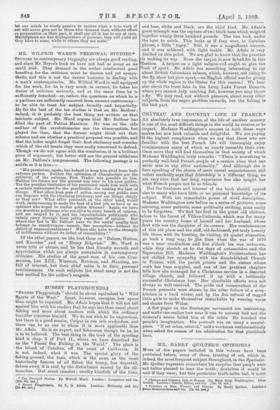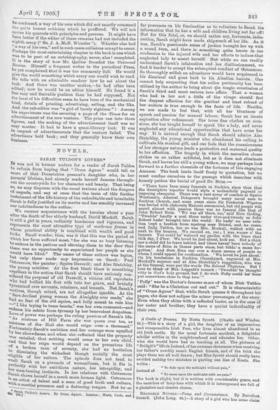MR. HARRY QUILTER'S OPINIONS.f
MosT of the papers included in this volume have been published before, some of them, treating of art, which is, indeed, the most frequent subject throughout, in the Spectator. Mr. Quilter expresses somewhere his surprise that people were not better pleased to hear the truth ; doubtless it would be well if they were; but this particular truth-teller had, it must • Chateau. and Country Lite in FIem.. By Nary Leg Waddington. trated. London Smith, Elder, and Co. [10e. O& net.] t Opinions on Men Women, ana Things. By Harry Quilter. Louden Swan lionnenaehein oak Co. Rae. 8d. net.3
be confessed, a way of his own which did not coraztly commend the quite honest criticism which he proffered. We will not revive his quarrels with principles and persons. It might have been better if the editor of these remaius had not included the eighth essay (" On J. A. MeN. Whistler "). Whistler also had "away of his own," and in such cases collisions are apt to occur. Perhaps the most entertaining chapter in the book is one which was to be part of an autobiography, never, alas ! completed. It is the story of bow Mr. Quilter founded the Universal Review. Himself a frequent writer in the periodical Press, he yet complained that it was too commonly dull. He would give the world something which every one would wish to read. He tells with an admirable candour how he set about the task. And there was another motive,—he had often been edited; now he would be an editor himself. He found it a less easy and desirable position than he had supposed. Not the least of his difficulties seem to have been of the mechanical kind, details of printing, advertising, selling, and the like. And the sub-editor was "a girl of barely eighteen" I Among his experiences was the securing a page of the Times for an advertisement of the new venture. The price ran into three figures, and the making of the advertisement itself was no easy matter, It had to have a quasi-literary look. It was In respect of advertisements that the venture failed. The advertisers held back ; and they generally know their own business.











































 Previous page
Previous page